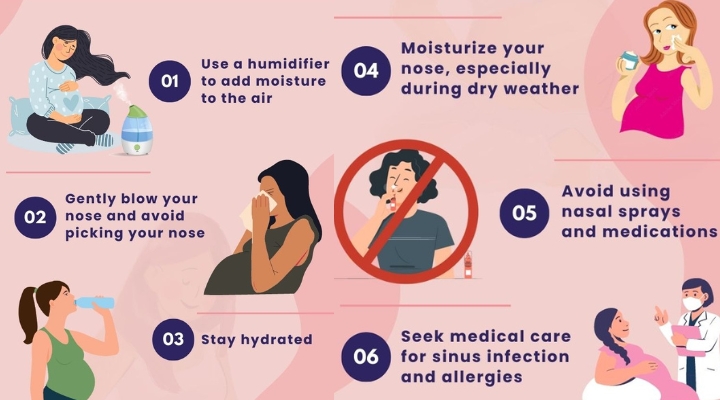Why only few women experience Nosebleeds during Pregnancy?
Pregnancy is a transformative and miraculous journey that brings about numerous changes in a woman’s body. In this article, we will learn about the reasons why only a few women experience nosebleeds during pregnancy. These changes are largely driven by the complex interplay of hormones and physiological adaptations that occur to support the growing fetus. Among the many well-known symptoms of pregnancy, nosebleeds are often reported but experienced by only a few women. This intriguing phenomenon has sparked scientific interest, leading researchers to explore the underlying mechanisms responsible for the occurrence of nosebleeds during pregnancy.
Understanding Nosebleeds during Pregnancy
Nosebleeds, medically known as epistaxis, are characterized by bleeding from the blood vessels in the nose. They can be caused by various factors, including dry air, allergies, nasal injuries, or high blood pressure. However, during pregnancy, the prevalence of nosebleeds is relatively low compared to other symptoms like morning sickness and fatigue.
The exact prevalence of pregnancy-related nosebleeds is not well-documented, but it is generally considered an uncommon symptom. Many women may experience other nasal issues such as congestion, stuffiness, or changes in the sense of smell, but true epistaxis is less common. The reasons behind this low occurrence can be attributed to the unique hormonal and vascular changes that pregnant women undergo.
Related-Is It Safe To Use A Heating Pad During Pregnancy?
Hormonal Factors
One of the primary drivers behind the occurrence of nosebleeds during pregnancy is the fluctuation in hormonal levels. Hormones play a pivotal role throughout pregnancy and influence various body functions, including vascular changes.
Two key hormones involved in pregnancy are estrogen and progesterone.
Estrogen-
During pregnancy, the levels of estrogen rise significantly. Estrogen is known to increase blood flow and dilate blood vessels, which can lead to nasal congestion in some women. Interestingly, it is the high levels of estrogen that may also help prevent nosebleeds to some extent. This hormone contributes to enhancing the elasticity of blood vessels, reducing the likelihood of vessel rupture and subsequent nosebleeds.
Progesterone-
Progesterone levels also soar during pregnancy, and this hormone has vasodilatory properties. It relaxes the smooth muscles in the blood vessel walls, leading to increased blood flow and decreased vascular resistance. However, unlike estrogen, progesterone’s effect on blood vessels may not be as pronounced, and it may not contribute significantly to nosebleeds during pregnancy.
Vascular Changes-
Apart from hormonal influences, pregnancy brings about significant changes in the vascular system, which play a role in the occurrence of nosebleeds. As the fetus grows, the body must adapt to support the increased blood volume and the additional demands of the developing baby.
Increased Blood Volume-
Pregnancy triggers a substantial increase in blood volume, which can put added pressure on the blood vessels. However, this is compensated by the body’s ability to dilate the blood vessels in response to hormonal changes, ensuring the blood flows efficiently without causing vessel rupture.
Nasal Mucosa-
The mucous membranes in the nose change during pregnancy. Increased blood flow to the nasal area and swelling of the mucous membranes may result in congestion and stuffiness. While nasal congestion is common, nosebleeds remain rare, indicating that the body’s mechanisms protect against vessel ruptures.
You can also check- Pregnancy Diet Chart – Healthy Daily Diet Chart For Pregnant
Blood Coagulation-
Pregnancy also alters the coagulation system, promoting a mildly hypercoagulable state to prevent excessive bleeding during childbirth. This enhanced coagulation may further reduce the risk of nosebleeds in pregnant women, as the body is primed to minimize bleeding from any site.
Lifestyle and Environmental Factors-
Though hormonal and vascular changes primarily drive the rarity of nosebleeds during pregnancy, lifestyle, and environmental factors also contribute to the overall incidence.
Hydration-
Staying hydrated is crucial during pregnancy to support the increased blood volume and overall bodily functions. Drinking enough water can help prevent dry nasal passages, reducing the likelihood of nosebleeds.
Nasal Irrigation-
Some pregnant women may experience nasal congestion, which can be managed by using saline nasal sprays or performing nasal irrigation. These practices can help maintain the moisture levels in the nasal passages and reduce the risk of nosebleeds.
Climate and Seasonal Factors-
The prevalence of nosebleeds can vary based on geographic location and seasonal changes. Dry climates can increase the likelihood of nosebleeds, regardless of pregnancy status.
Symptoms of nosebleeds during pregnancy
Nosebleeds during pregnancy can vary in severity and frequency from woman to woman. While some may experience occasional and mild nosebleeds, others may have more frequent or severe episodes. The symptoms of nosebleeds during pregnancy typically include-
Bleeding from the Nose-
The most obvious symptom of a nosebleed is bleeding from one or both nostrils. The blood may be bright red or darker in color, and it can flow out steadily or in a trickle.
The feeling of Dripping or Running Blood-
Some women may feel as though the blood is dripping or running down the back of their throat. This sensation occurs when the blood from the nose enters the throat through the nasal passages.
Stuffy or Congested Nose-
Before a nosebleed, some women may experience nasal congestion or stuffiness. This congestion can be attributed to the increased blood flow and swelling of the nasal mucosa.
Mucus with Blood-
In some cases, the nosebleed may be accompanied by mucus that contains traces of blood. This occurs when the blood mixes with the nasal secretions.
Discomfort or Tenderness-
During and after a nosebleed, you may experience slight discomfort or tenderness around the nasal area.
Anxiety or Nervousness-
Nosebleeds can be surprising and sometimes distressing, leading to feelings of anxiety or nervousness, especially if it’s the first time you experience one during pregnancy.
Frequency and Duration-
The frequency and duration of nosebleeds can vary. Some women may only experience a single episode, while others may have recurrent nosebleeds during their pregnancy.
What should I do to avoid getting a nosebleed?
To minimize the risk of getting a nosebleed, especially during dry or allergy-prone seasons, follow these preventive measures:
Keep Nasal Passages Moist-
Dry nasal passages are more susceptible to irritation and bleeding. Use saline nasal sprays or apply a small amount of petroleum jelly inside the nostrils to keep them moist.
Use a Humidifier-
Use a humidifier in your home, especially in the bedroom, to maintain a comfortable level of humidity. This helps prevent the air from becoming too dry, which can irritate the nasal passages.
Related-10 Top Foods To Avoid During Pregnancy – You Must Know!
Stay Hydrated-
Drink plenty of water throughout the day to stay hydrated. Hydration helps maintain the moisture levels in your body, including the nasal passages.
Avoid Irritants-
Stay away from strong odors, smoke, and allergens that may irritate the nasal lining. If you have allergies, try to minimize exposure to triggers and consider using air purifiers in your living spaces.
Use Nasal Irrigation-
Consider using a saline solution or nasal rinse to keep your nasal passages clean and moisturized. Nasal irrigation can help remove debris and allergens, reducing the risk of irritation.
Be Gentle with Your Nose-
Avoid picking your nose or blowing it too forcefully, as these actions can cause trauma to the delicate blood vessels in the nasal passages.
Avoid Dry Environments-
If possible; avoid spending extended periods in dry environments. If you must be in such an environment, take extra precautions to keep your nasal passages moist, such as using a saline nasal spray frequently.
Address Allergies-
If you have seasonal allergies, work with your healthcare provider to manage them effectively. Controlling allergies can reduce nasal inflammation and lower the risk of nosebleeds.
Be Mindful during Climate Changes-
Be especially cautious during climate changes or when traveling to different regions with varying humidity levels. Adjust your nasal care routine accordingly.
Discuss Medications with Your Doctor-
If you are on any medications during pregnancy, talk to your healthcare provider about potential side effects that may contribute to nasal dryness or bleeding.
How to stop nosebleeds during pregnancy?
Experiencing a nosebleed during pregnancy can be unsettling, but there are several simple steps you can take to stop the bleeding and alleviate the discomfort. Here’s a step-by-step guide on how to stop a nosebleed during pregnancy-
Stay Calm-
While nosebleeds can be concerning, it’s essential to stay calm and composed. Stress and anxiety can elevate blood pressure, potentially worsening the bleeding.
Sit Upright-
Sit down in a comfortable position and keep your head elevated. This helps reduce blood flow to the nasal area and may help stop the bleeding.
Lean Forward-
Tilt your head slightly forward. This prevents blood from flowing down your throat, reducing the risk of ingesting blood and potential nausea.
Pinch the Nostrils-
Use your thumb and index finger to pinch both sides of your nostrils shut. Maintain firm pressure for about 10-15 minutes without releasing. This helps apply direct pressure to the bleeding vessels and encourages clot formation.
Breathe through Your Mouth-
While pinching your nostrils, breathe through your mouth to avoid disrupting the clotting process.
Apply Ice-
Placing a cold pack or ice wrapped in a cloth over the bridge of your nose may help constrict the blood vessels, further assisting in stopping the bleeding.
While pregnancy brings about numerous physiological changes, the incidence of nosebleeds remains relatively low, owing to a delicate balance of hormonal influences and vascular adaptations. The rise in estrogen levels contributes to enhanced vascular elasticity, while progesterone induces vasodilation. These hormonal changes, combined with increased blood volume and alterations in the nasal mucosa, work together to minimize the occurrence of nosebleeds.
Despite the rarity of nosebleeds during pregnancy, expectant mothers need to pay attention to their health, stay hydrated, and seek medical advice if they experience any concerning symptoms. By understanding the intricate mechanisms behind nosebleeds during pregnancy, we can better appreciate the remarkable ways in which the female body adapts to support the growth and development of new life.
Frequently Asked Questions-
Are nosebleeds during pregnancy a cause for concern?
In most cases, nosebleeds during pregnancy are not a cause for concern. They are typically considered a normal and temporary side effect of hormonal changes and increased blood flow. However, if the nosebleeds are frequent, severe, or accompanied by other concerning symptoms, such as dizziness or severe headache, it’s essential to consult a healthcare provider to rule out any underlying issues.
Can nosebleeds during pregnancy be prevented?
While it may not be possible to completely prevent nosebleeds during pregnancy, some steps can help minimize their occurrence. Staying hydrated, using a humidifier to maintain moisture in the air, avoiding irritants like cigarette smoke or strong odors, and using saline nasal sprays or rinses to keep the nasal passages moist are some strategies that might help reduce the frequency of nosebleeds.
I would like to know when it’s necessary to seek medical attention for nosebleeds while pregnant.
In most cases, nosebleeds during pregnancy are benign and resolve on their own. However, you should seek medical attention if you experience frequent, heavy nosebleeds that do not stop within 20 minutes, or if you notice excessive bleeding from other parts of your body, as it may indicate a more serious underlying issue. Additionally, if you feel lightheaded, dizzy, or have difficulty breathing during a nosebleed, it is essential to contact a healthcare professional immediately.
Can nosebleeds during pregnancy affect the baby?
Nosebleeds during pregnancy do not directly affect the baby. They are generally a result of the changes happening in the mother’s body. However, if nosebleeds are accompanied by high blood pressure or other concerning symptoms, it could potentially indicate a condition like preeclampsia, which can affect both the mother and the baby. That’s why it’s essential to monitor any unusual symptoms during pregnancy and consult with a healthcare provider for proper evaluation and guidance.










